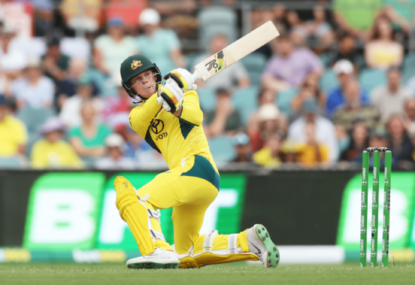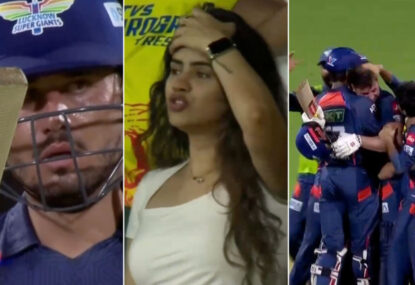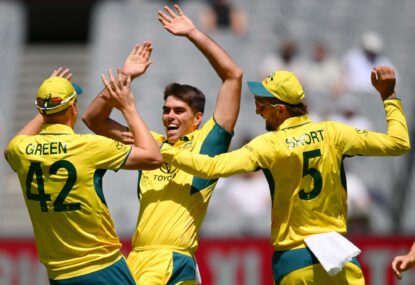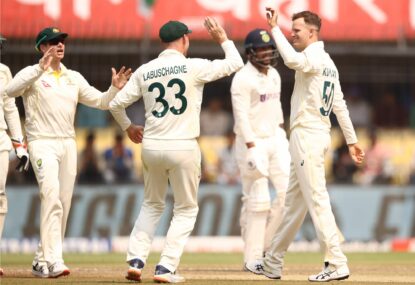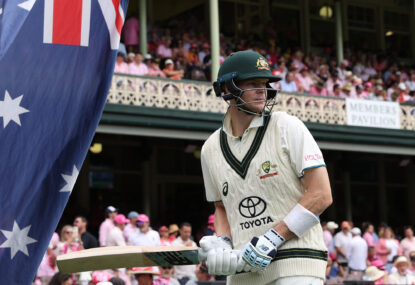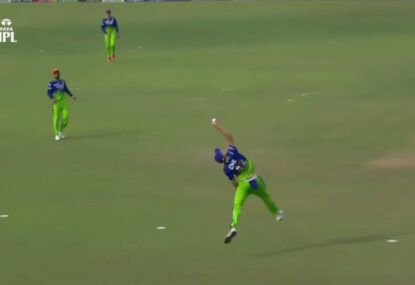As we see the balance of power shift away from Australia in test cricket, we see fewer contributors from the Baggy Green to the World team of the year.
It was also pleasant to see test cricket play an integral part on the cricketing calendar again – with 47 tests played, against only 31 in 2007. There were also more results again, as only 23% of Test matches played ended in a draw.
Undoubtedly 2008 was the year of the bat, with 12 players scoring more than 1000 test runs, more than any other year in history.
And as for team’s dominance, the year belonged to South Africa, with their 11 test wins equalling the record held by the West Indies and England. While bashers might argue that four of those wins were against Bangladesh, inflicting Australia’s first home defeat in over 16 years gave honours.
Let’s look at the team! (with 2008 statistics)
1 – Graeme Smith (C) – South Africa, 1573 runs at 74.90
The automatic selection of the team and captain. Flayed all attacks during the year, and under his command South Africa have been unbeaten in series for two years. His crowning achievement was South Africa’s away conquering of both England (first time in 43 years) and Australia (first time in history). To add to this, Smith took 30 catches for the year, breaking Stephen Fleming’s record.
2 – Virender Sehwag – India, 1462 runs at 56.23
Just over 12 months ago looked consigned to the cricketing wilderness, before coming back against Australia re-cementing his place in the team with a 151 in Adelaide. But it was against South Africa in Chennai in his subsequent innings that he made history, hitting the fastest triple century in Test cricket history (319), the highest score by an Indian player. In Sri Lanka, where the Fab Four struggled, he hit a brilliant undefeated double century to win the Galle test. A primeval talent.
3 – Ricky Ponting – Australia, 1126 runs at 46.91
As a captain his credentials continue to be questioned, but there is no doubting the batting mastery of a man fast becoming one of the greatest batsmen in history. 4 centuries and 4 half-centuries was an excellent return considering in 2007 he went 13 months without a test century. Became the third fastest man to reach 10,000 test runs this year, and now has the second most test centuries of all time.
4 – Mahela Jayawardene – Sri Lanka, 666 runs at 60.54
Just edges out Michael Clarke, who played almost double the number of test matches in 2008. The elegant stroke maker – also the Sri Lankan captain and 2007’s Wisden Cricketer of the year; Mahela is regarded as one of the finest batting technicians in the world today. A shame Sri Lanka don’t play more matches to see this artist in action.
5 – Shivnarine Chanderpaul – West Indies, 774 runs at 86.00
Finished with the highest test average in 2007 and 2008, and had a nine innings form run this year that read 86*, 118, 11, 107*, 77*, 79*, 50, 76, 126. The ICC 2008 player of the year’s recent form has been the equal of greats Vivian Richards and Brian Lara. This is despite him being a coaches nightmare in regard to his unorthodox technique.
6 – A B De Villiers – South Africa, 1036 runs at 64.75
Regarded as many as one of the most naturally born sportsmen South Africa has ever produced, who came of age in 2008, scoring 217 not out against India, the highest test score by a Protea batsmen. He was also brilliant in England, scoring a magnificent 174 at Headingly, which was essentially the catalyst for the winning of the series. Becoming one of the great fieldsmen of the game.
7 – Brendan McCullum – New Zealand, 764 runs at 33.21
Just edges out MS Dhoni – who finished with similar batting statistics to the Kiwi, but McCullums ability to score quickly and superior keeping averages won him his position. A destructive keeper batsmen in the tradition of the great Adam Gilchrist, he scored six half centuries this year, and unlike Dhoni does not have a world class batting order above him to set the tone. He finished the year with the second most keeper dismissals (53) and averaged more dismissals per innings than any other keeper in 2008.
8 – Mitchell Johnson – Australia, 61 wickets at 27.39
Johnson finished the year as Australia’s premier strike bowler – and too often – the complete bearer of the Baggy Green attack. He has come a long way from the young man who seemed to consistently bowl the incorrect line, and now appears to be evolving into an all rounder, with a test batting average now approaching the mid-twenties. Ended the year with the second best bowling statistics in the world.
9 – Dale Steyn – South Africa, 69 wickets at 21.33
Untouched as the best bowler in the world, following on from his outstanding 2007 where he took 44 wickets in seven tests. Named the ICC test player of the year – he has come from being a raw all out pace merchant to being a future great, passing in 2008 Allan Donald’s record of the fastest South African to take 100 test wickets.
10 – Ryan Sidebottom – England, 47 wickets at 20.25
One of Wisden’s cricketers of the year (alongside Ian Bell, Chanderpaul, Zaheer Kahn and Ottis Gibson) Sidebottom is a throwback to yesteryear being a classic line and length bowler – who was initially discarded by England as they sought all out pace. Despite playing 4-5 tests less than other top 2008 bowlers, he achieved 4 five wicket hauls (Steyn and Daniel Vettori got 5) and seamed the ball magnificently in New Zealand. The perfect first change bowler.
11 – Muttiah Muralitharan – Sri Lanka, 43 wickets at 24.46
Despite playing half the matches of most bowlers in 2008, the leading wicket taker in test cricket history still managed to take 43 wickets in 2008. Usually criticised for his wickets coming against weak opposition, he took 21 wickets in the three match series against India. It was the ninth year in a row that the master took at least 40 wickets.
By Country
South Africa 3, Sri Lanka 2, Australia 2, West Indies 1, India 1, New Zealand 1, England 1






























































































